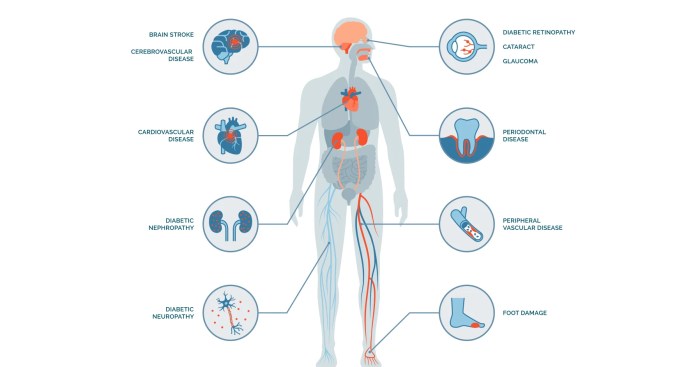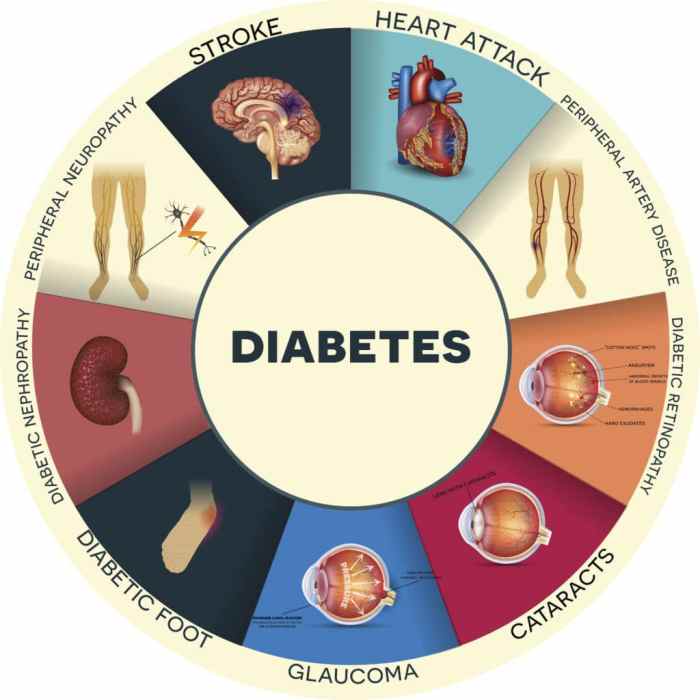Which of the following statements about diabetes mellitus is false? This question delves into the intricacies of this prevalent condition, exploring common misconceptions and shedding light on the complexities of its management. Diabetes mellitus, a chronic metabolic disorder characterized by elevated blood glucose levels, has become a global health concern, affecting millions worldwide.
This article aims to provide clarity and dispel myths surrounding diabetes, empowering individuals with accurate information.
Diabetes mellitus encompasses two primary types: type 1 and type 2. Type 1 diabetes, an autoimmune condition, arises when the body’s immune system mistakenly attacks and destroys insulin-producing cells in the pancreas. In contrast, type 2 diabetes, the more prevalent form, is characterized by insulin resistance, where the body’s cells become less responsive to insulin, leading to impaired glucose uptake.
Diabetes Mellitus Definition and Types

Diabetes mellitus is a metabolic disorder characterized by elevated blood glucose levels resulting from either impaired insulin production or resistance to insulin action. It is classified into two main types: type 1 and type 2.
Type 1 diabetes is an autoimmune disease in which the body’s immune system mistakenly attacks and destroys the insulin-producing beta cells in the pancreas, leading to an absolute deficiency of insulin. This type usually develops in childhood or adolescence and requires lifelong insulin therapy.
Type 2 diabetes is characterized by insulin resistance, in which the body’s cells do not respond adequately to insulin. Over time, this can lead to a decrease in insulin production and eventually to type 2 diabetes. This type is more common in adults and is often associated with obesity and physical inactivity.
Symptoms and Diagnosis

Common symptoms of diabetes mellitus include:
- Increased thirst
- Frequent urination
- Unexplained weight loss
- Increased hunger
- Fatigue
- Blurred vision
Diabetes is diagnosed through blood glucose tests, which measure the amount of glucose in the blood. The most common tests used are:
- Fasting plasma glucose test
- Oral glucose tolerance test
- HbA1c test
The HbA1c test measures the average blood glucose levels over the past 2-3 months and is often used to monitor diabetes management.
Risk Factors and Prevention

Major risk factors for developing diabetes mellitus include:
- Genetics
- Obesity
- Physical inactivity
- Age (over 45 years)
- Family history of diabetes
- Gestational diabetes
- Polycystic ovary syndrome (PCOS)
Lifestyle modifications can help prevent or delay the onset of diabetes, including:
- Maintaining a healthy weight
- Engaging in regular exercise
- Adopting a balanced diet
- Quitting smoking
- Managing stress
Management and Treatment: Which Of The Following Statements About Diabetes Mellitus Is False
The treatment of diabetes mellitus depends on the type and severity of the condition. Options include:
- Insulin therapy
- Oral medications
- Lifestyle interventions
Insulin therapy is necessary for individuals with type 1 diabetes and may be required for some individuals with type 2 diabetes. Oral medications can help lower blood glucose levels by increasing insulin production or sensitivity. Lifestyle interventions, such as diet and exercise, are crucial for managing both type 1 and type 2 diabetes.
Regular monitoring of blood glucose levels is essential for effective diabetes management. This allows individuals to make appropriate adjustments to their treatment plans and reduce the risk of complications.
Complications and Prognosis

Potential complications of diabetes mellitus include:
- Cardiovascular disease
- Kidney disease
- Diabetic retinopathy
- Neuropathy
- Foot ulcers
- Amputations
The prognosis for individuals with diabetes depends on the type of diabetes, severity of the condition, and effectiveness of management. Early detection and management are crucial for minimizing the risk of complications and improving the overall prognosis.
User Queries
Is diabetes mellitus a curable condition?
While there is currently no cure for diabetes mellitus, effective management strategies can help control blood glucose levels and prevent complications.
Are all types of diabetes caused by lifestyle factors?
No, type 1 diabetes is an autoimmune condition that is not directly linked to lifestyle choices.
Can people with diabetes mellitus eat sugar?
Yes, but in moderation. Individuals with diabetes should carefully monitor their sugar intake and consult with a healthcare professional for personalized dietary guidance.